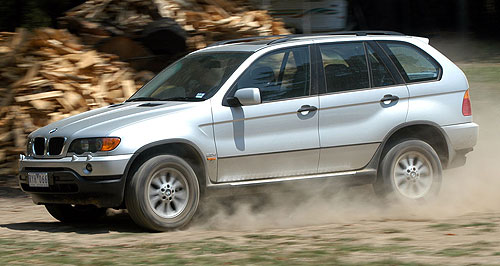Make / Model Search
News - General News - SafetyTakata recall spreads to more BMWsRecalled: The classic BMW E46 3 Series hasn’t featured on GoAuto’s pages for many years but an expanding airbag recall has brought it back into the spotlight, along with the original X5 and E39 5 Series. Earlier model BMW 5 Series, 3 Series and X5 impacted by Takata airbag fault9 Aug 2016 TAKATA’S seemingly endless global airbag recall saga continues to spread, with another 28,577 BMW models now added to the list of vehicles that may be rolling on Australian roads fitted with potentially dangerous airbags. In the latest round of notifications, examples of the first-generation E53 X5, as well as the E39 5 Series and E46 3 Series have been identified as having the potentially faulty airbag inflator module, joining the list of already recalled vehicles in Australia, which is heading towards the one million mark. That figure pales by comparison with the United States, where the tally for effected vehicles has passed 68 million, and has spread to a number of major global car-makers including General Motors, Ford, Daimler, BMW, Honda, Mitsubishi, Mazda, Subaru, Nissan, Fiat Chrysler Automobiles and Toyota. The German car-maker has now listed a number of propeller-badged models built between January 2002 and August 2006 requiring a recall for precautionary replacement of the Takata-made safety restraint system component. Given the age of the most recently identified vehicles, it is likely that in many cases BMW’s customer records are out of date, and owners of potentially impacted models are advised to contact the car-maker to establish if their car needs attention. Alternatively, owners can go to the Australian Competition and Consumer Commission (ACCC) product safety recall website where a full list of chassis numbers is available. The Takata manufacturing fault was first detected in 2009 following a number of cases in the US where vehicle occupants had been injured by shrapnel from exploding airbag modules. A fault in the assembly process failed to seal the metal inflator cannisters, which in regions of high humidity and fluctuating temperature allowed moisture into the ammonium nitrate propellant. The moisture-contaminated propellant is more unstable and when triggered, ignites faster than unaffected propellant, causing the metal case to rupture and potentially injure passengers. While the fault has caused 10 fatalities and 100 cases of injury in the US, no incidents have been reported in Australia.  Read more |
Click to shareGeneral News articlesResearch General News Motor industry news |












Facebook Twitter Instagram